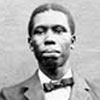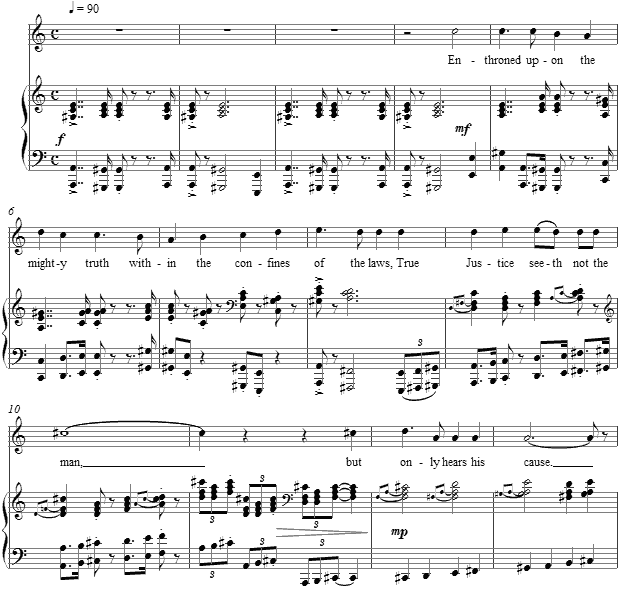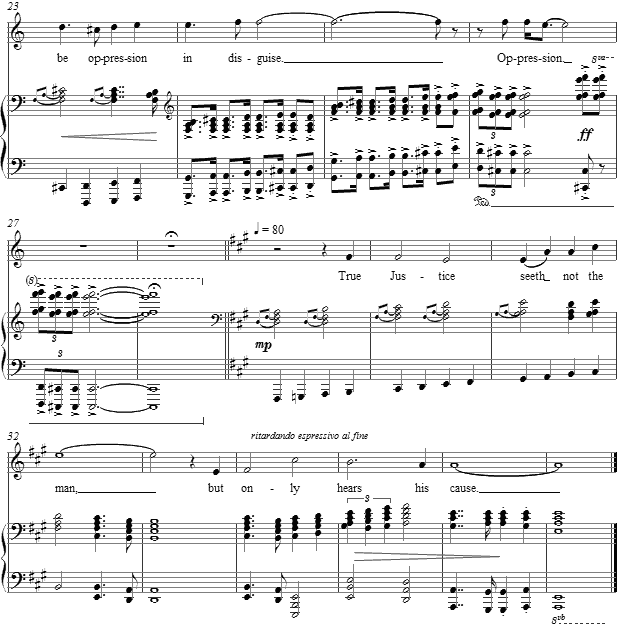Music and Texts of GARY BACHLUND
Vocal Music | Piano | Organ | Chamber Music | Orchestral | Articles and Commentary | Poems and Stories | Miscellany | FAQs
Justice - (2010)
Paul Laurence Dunbar
for medium or high voice and piano
Enthroned upon the mighty truth,
Within the confines of the laws,
True Justice seeth not the man,
But only hears his cause.
Unconscious of his creed or race,
She cannot see, but only weighs;
For Justice with unbandaged eyes
Would be oppression in disguise.[ 2 pages, circa 1' 50" ]
Paul Laurence Dunbar
The notion of justice has been bandied about after the advent of cultural Marxism in the early twentieth century, morphed into various schemes under the generalized banner of "social justice" and then had the bandage ripped from the image of "blind justice" to be corrected -- by various political perspectives -- into a kind of justice in which the cause is deeply colored by political and historical revisionism. For this quotas have been applied to decision making as enforced by laws and courts, and whole revolutionary movements aimed at one group's historical and institutional racism, sexism, homophobia, Islamophobia and a variety of other "causes" which have served to overturn an individual's "cause" -- in Dunbar's sense -- in court. Dunbar applauds blind justice, as do I.
This setting came to be alongside reading the news of Russian President Dmitry Medvedev's very clear statement that the Union of Soviet Socialist Republics "cannot be called anything other than totalitarian." Given the many decades when the public image of the Soviet Union has been held out by academics and theorists as some kind of exemplary "social" state intent of justice applied according to Marxist principles, this clear statement by the Russian president must come as a shock -- perhaps even betrayal -- to those wild-eyed advocates of ripping the bandages from blind justice for the sake of their belief. Dunbar counsels us from a time when blacks were more harshly treated than in the last decades, and yet in the United States the black leadership cries for "social justice" in direct antithesis to this poet's clear meaning.
The setting on A minor with its included major seventh, a chord which serves to underscore the entire first seven measures. Rising out of this through major and minor subdominants comes the mention of "Justice" itself, as the texture relaxes as impartial justice will "hear" man's cause. A second strophe opens as does the first.
The last line of the poem declares its meaning furiously, that justice stripped of its blindfold becomes oppression. For the the setting erupts into martial rhythm and half step dissonances to underscore both oppression and the speed with which it can arise. As contrast and in resolution, the setting returns to the last lines of the first stanza as the tonal change from minor to major revisits Dunbar's clear statement about impartial justice.
The score for Justice is available as a free PDF download, though any major commercial performance or recording of the work is prohibited without prior arrangement with the composer. Click on the graphic below for this piano-vocal score.


